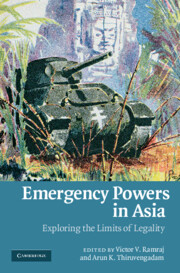Book contents
- Frontmatter
- Contents
- List of contributors
- Preface
- 1 Introduction: emergency powers and constitutionalism in Asia
- PART I Perspectives from legal and political theory
- PART II Postcolonial and post-conflict transitions
- PART III Emergencies, executive power and constitutional order
- PART IV The role of the courts
- 14 Constitutionalised emergency powers: a plague on Asian constitutionalism?
- 15 Political emergencies in the Philippines: changing labels and the unchanging need for legitimacy
- 16 Islamism as a response to emergency rule in Pakistan: the surprising proposal of Justice A. R. Cornelius
- 17 Asian judiciaries and emergency powers: reasons for optimism?
- Index
- References
15 - Political emergencies in the Philippines: changing labels and the unchanging need for legitimacy
from PART IV - The role of the courts
Published online by Cambridge University Press: 04 August 2010
- Frontmatter
- Contents
- List of contributors
- Preface
- 1 Introduction: emergency powers and constitutionalism in Asia
- PART I Perspectives from legal and political theory
- PART II Postcolonial and post-conflict transitions
- PART III Emergencies, executive power and constitutional order
- PART IV The role of the courts
- 14 Constitutionalised emergency powers: a plague on Asian constitutionalism?
- 15 Political emergencies in the Philippines: changing labels and the unchanging need for legitimacy
- 16 Islamism as a response to emergency rule in Pakistan: the surprising proposal of Justice A. R. Cornelius
- 17 Asian judiciaries and emergency powers: reasons for optimism?
- Index
- References
Summary
Introduction
It was former President Ferdinand Marcos who boldly declared that his emergency measures aimed to reform society. He claimed that he wanted not just to quell a rebellion but to remedy the social inequalities that fuelled it. He still invoked every positivist cover for his dictatorship, constitutional text as well as manipulated referenda masquerading as the people's voice, but he did not shirk from fundamentally reconceiving the notion of emergency, shifting from a preservative ‘national security’ purpose to a transformative and ‘revolutionary’ rationale. The post-Marcos Constitution of 1987 rejected Marcos's ideological challenge by reiterating the tried and tested liberal formula, reinstating the national security rationale as the sole basis for emergency rule and instituting procedural checks-and-balances that cabined the national security powers. The 1987 Constitution was designed deliberately to forestall a return to a Marcos-style dictatorship, and allowed emergency powers only under several layers of institutional safeguards.
Yet the real irony is that whatever was left of those powers was not invoked during the truest emergency in recent history, the January 2001 uprising that actually toppled a sitting President, Joseph Estrada. Worse, his successor, Gloria Macapagal-Arroyo, has since faced several actual threats and has thrice declared one or another sort of emergency triggered by the endless corruption scandals that elsewhere – as with Thaksin in Bangkok – would have sufficed to topple a leader who – in contrast to Thaksin – did not enjoy a popular mandate.
- Type
- Chapter
- Information
- Emergency Powers in AsiaExploring the Limits of Legality, pp. 412 - 435Publisher: Cambridge University PressPrint publication year: 2009



